Tuesday, November 01, 2005
Monday
Vice Admiral Moran is describing the competency management system of the U.S. Navy. I heard this pitch at the eLearning conference sponsored by George Mason University and Defense Acquisition University last year.
The former CNO, who set this project in motion, must have told his people to use MBA-speak to describe what they are doing. The talk is peppered with words like “connection to the top line”, “merger,” “human capital,” and “our business.” The “five-vector model” creates a “resumé” for every sailor. The admiral could benefit from reading The Cluetrain Manifesto. This strikes me a show time, okay for initial shock value but boring after a short while.
I’m beginning to filter what I’m experiencing here as old-school or new-school. Last night Elliott talked about the excitement of the new school approach, but then talked at us for two hours. Granted, there were interviews interspersed, but audience involvement was little. At one point, Elliott said, “I’ve lost control,” missing the point that the future entails getting control by giving control. Old ways die hard. This morning’s session is more interviews, less Elliott: an improvement, but still the sage(s) on the stage.

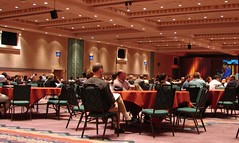

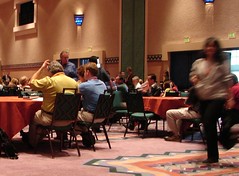
Tuesday
 Oh what a beautiful morning. (It's pouring outside at the moment. I decided to pass on MGM Land.
Oh what a beautiful morning. (It's pouring outside at the moment. I decided to pass on MGM Land.
This was the third or fourth time I’ve heard Malcolm Gladwell, and he’s getting better every time. People think they are autonomous. However, a lot of behavior is determined by context, by environment.
 Blink – a police officer behaves differently when alone and when in a group. Many of the mistakes are made in groups. Keep him alone to bring out the best. Change the context, change the behavior.
Blink – a police officer behaves differently when alone and when in a group. Many of the mistakes are made in groups. Keep him alone to bring out the best. Change the context, change the behavior.
If they could change anything about schools, they should eliminate the teacher’s room: where they vent and gripe. Better to put them in the cafeteria where they talk one to one.
How am I different in terms of how I respond to the environment I am part of?
Next: what subtle differences between us will impact the way we structure the future?
Statue at the Getty. The kairos. Takes two ways of thinking to evaluate. Analysis didn’t spot a fake in 14 months of effort; artists recognized the forgery for what it was immediately. Best decisions come from both ends of the spectrum.
Thin slicing. Rapid judgments. We all do it all the time. Tigerrun. Experts are thin-slicers. With experience, the decision-making process moves inexorably from conscious decision-making to unconscious “intuition.”
Driving. Why don’t we have accidents all the time? Why do teenagers have a 100x accident rate? They can’t thin slice. Teenage brain is crawling. Make the car safe? No. Train the driver to be safe.
Day in the life of Malcolm. Fairly haphazard, by design. Constantly trying ideas on for size. Have several continuing interests. Just kind of walk around. Take notes. Wander around the stacks in the library.
Messy desk is a judgment from someone who doesn’t understand your learning style. If it’s your desk, you know where everything is.
Same hiring process doesn’t work for all jobs. If first impression is most important, make decisions on basis of first impression. If candidates never meet the public, you may not want to meet them at all. Screening future professors puts them in a high-risk, high-pressure situation (the mock lecture), yet this is just what they are seeking to avoid by becoming professors. In selection, one size does not fit all.
Information glut. Take, for example, a doctor. Specialize ad infinitum? Eventually people start to max out. The loss of the generalist means no one sees the big picture. It’s hard for anyone to have a unified strategy. There’s a threshold where additional information leads to dysfunctional behavior. Give someone more choices on their 401K, and they shy away from the whole deal (which is not in their best interest.)
One of humankind’s biggest problems in decision-making is that assigning the wrong weights to the variables. Anything that can help us assign better weights is worth doing. If I have an ethical system, I have a way of assigning those weights. It clarifies how we make our decisions.
When should we trust our intuition? Is there a method to assess how confident we should be about what we intuit? On the road, we intuit well because we have lots of experience. A mother’s intuition is acquired. At first she relies on books; by child number three, she just knows.
Steve Johnson, John Abele, Malcolm Gladwell all on stage.
SJ: On the web, zooming out. You look at a restaurant page. Then you zoom out to see what other people are saying. Technorati, Del.icio.us, make it possible to look at things you couldn’t find before.
SJ: Games know how proficient you are.
SJ: Attention-space of users in user interface design.
Geez, Steve is in high-bandwidth mode.
JA: Democratization of knowledge. Institutions can no longer hoard knowledge.
MG: Medicine is so invested in the closed system that once worked fine. When medicine ceased to deliver, this became problematic. We’re going to have to choose another way. If they’re not willing to keep up and to learn, we have to junk them.
SJ: Stacks in the library? I don’t know what you’re talking about.
MG: The interesting person doesn’t know what’s interesting about her. I have to have a conversation….
EM: Who’s the teacher? What’s a tipping point? (Table discussions.)
JA: The ability to lose control.
SJ: EPCOT. Felt closer to the 19th century than the 21st. This would be insane to a 10 year old. The media these days knows something about you and reacts that way.
EM: U.S. is becoming less the center of the universe.
MG: Fundamentally redefining the social contract between people and their employers. It used to be about “benefits.” They’re not going to take care of us any more.
MG changes into Marshal Goldsmith.
Marshal… Coach helps successful leaders do what they do better. Malcolm’s a Buddhist. I don’t deal with the past at all. I am focused 100% on the future.
Every night I get a call. I do it to keep it in my head. How happy was I today? I know how hard it is to change.
Your dream. “I’m incredibly busy right now. I feel as busy as I ever have. Sometime my life is a little out of control. The worst will be over in four or five years. I’ll begin my healthy lifestyle and everything will be okay.”
Learn as much as I can. Help as much as I can.
No feedback about the past. Only ideas for the future.
No judgment about the future.
Mark Oehlert and I talked about the structure of this event. It’s open, as in open source. Everyone is providing feedback. The Masie Center will be able to craft a better Learning2006 as a result. They will not only leapfrog into top position, they will also have what it takes to remain there.
Breakout Sessions.
I jumped from one session to another.
What do learning managers really manage?
“Informal” means breaking into small groups to these folks.
Asking questions of participants before session starts.
• Better define your own role
• Stare experiences, broaden understanding
• Scope of what we manage
• Beyond management to leadership
Approach is to post five questions, e.g.
• Organization throws things at her that they “shouldn’t.” What should be managed that is not?
• How do we coach others to become LMs?
• What is your job description?
• What does it mean to be a learning manager?
• Does internal/external hiring matter?
Other Sessions
Vendors almost universally presented PowerPoint (a no-no) sales presentations (another no-no) to people lined up in rows (doesn’t promote informality). If the vendor community doesn’t change with the times, the times will break them.
Question: What would you do differently about Learning 2005?
1. Peanuts and beer in the LearnLand.
2. More clarity around role of facilitator.
3. Segment sessions into beginner and veteran.
4. More give and take in the main-stage events.
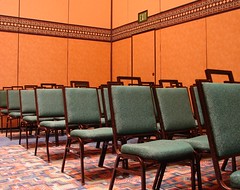
What's wrong with this picture. (The layout discourages interaction.)
Informal session…
Dick Sethi, Organic Leadership
Larry Israelite, director of strategic learning, Pitney Bowes
This is a discussion… the wisdom of the crowd.
We will break into small groups to discuss. Get back together to report. (This is the new formal informal.) However, we never got into groups, preferring a whole-group discussion.
Dick: How to combine formal and informal for optimal results? Dose of each.
Larry: Here as resident crank. We spend too much time with things we know nothing about. Learn by doing = haphazard learning. Trade-off of serendipity vs. danger of propagating mal-memes.
Lots of Q&A. Lack of structure? How to balance? Sometimes the payoff is in hindsight. The LMS should track whether you use it after the fact, whether or not you apply it and grow from it.
Don’t call it learning.
People are people, not objects under the control of HR.
Self awareness, EQ, reflection.
Intentional. This session never came back to the questions we started with. Informal need not mean inattentive.
HR/training people seem to feel they’re in control of people’s lives. We have lives outside of work and learning.
Proton Media Session
The e-Sociology of Learning.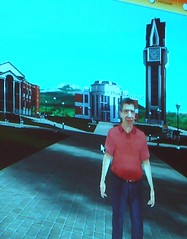
Use the media they know—Warcraft, Sims, TurboTax, etc. (I’d been thinking of this as an advantage of my “Internet Inside” concept. We shouldn’t be forcing people who know how to use a browser entirely new interfaces.)
[Just for you: Two molecules are walking down the street. One says “Oops I think I lost an electron.” The other: “Are you positive?”]
Ron Burns: Not all games the same at all. Learning is a primal response for survival. We are a tribe. (Don Clark pointed out that “learning may be natural,” but it’s not normal for boys to learn algebra.)
Gaming puts you in a world. “All we do is make games that sell.” We’re competing for attention.
Protosphere is a game-like multi-learner platform. A first-person portal that sits above the LMS.
 Our awsome participant pick-up rock band. Video to come shortly.
Our awsome participant pick-up rock band. Video to come shortly.
Back to the main tent
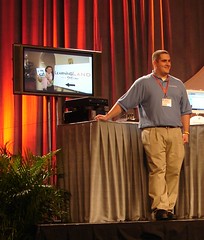 Gerry, a sophmore at RIT and but 19 years old, has become our folk hero.
Gerry, a sophmore at RIT and but 19 years old, has become our folk hero.
Consortium: $5000 membership per company. Comes with two tickets to LearningLand. 191 companies are members.
UPS: how do you know people are ready?
Nano-learning. How do you offer a 90-second module? How do design for this? Take a look at a 30-second commercial. (The event photographer and I talked about learning to take photos. Feedback from digital pics is immediate.)
Kathleen Kennedy Townsend. Bobby’s eldest daughter.
 Wayne
Wayne
Just right is in the eye of beholder. It doesn’t mean perfect. Wayne has become our philosopher and oracle, the answerer of hairy questions.
Content is powerless on its own.
Elliott
Told textbook publishers to give away the books. Sell the yellow highlights.
Tomorrow morning I'm out of here, so this will be my last post from Orlando. Elliott intends to keep the conference site & wiki open all year, including hundreds of photos, so you won't lack for sources if you want to track this event.
Vice Admiral Moran is describing the competency management system of the U.S. Navy. I heard this pitch at the eLearning conference sponsored by George Mason University and Defense Acquisition University last year.
The former CNO, who set this project in motion, must have told his people to use MBA-speak to describe what they are doing. The talk is peppered with words like “connection to the top line”, “merger,” “human capital,” and “our business.” The “five-vector model” creates a “resumé” for every sailor. The admiral could benefit from reading The Cluetrain Manifesto. This strikes me a show time, okay for initial shock value but boring after a short while.
I’m beginning to filter what I’m experiencing here as old-school or new-school. Last night Elliott talked about the excitement of the new school approach, but then talked at us for two hours. Granted, there were interviews interspersed, but audience involvement was little. At one point, Elliott said, “I’ve lost control,” missing the point that the future entails getting control by giving control. Old ways die hard. This morning’s session is more interviews, less Elliott: an improvement, but still the sage(s) on the stage.




Tuesday
 Oh what a beautiful morning. (It's pouring outside at the moment. I decided to pass on MGM Land.
Oh what a beautiful morning. (It's pouring outside at the moment. I decided to pass on MGM Land.This was the third or fourth time I’ve heard Malcolm Gladwell, and he’s getting better every time. People think they are autonomous. However, a lot of behavior is determined by context, by environment.
 Blink – a police officer behaves differently when alone and when in a group. Many of the mistakes are made in groups. Keep him alone to bring out the best. Change the context, change the behavior.
Blink – a police officer behaves differently when alone and when in a group. Many of the mistakes are made in groups. Keep him alone to bring out the best. Change the context, change the behavior.If they could change anything about schools, they should eliminate the teacher’s room: where they vent and gripe. Better to put them in the cafeteria where they talk one to one.
How am I different in terms of how I respond to the environment I am part of?
Next: what subtle differences between us will impact the way we structure the future?
Statue at the Getty. The kairos. Takes two ways of thinking to evaluate. Analysis didn’t spot a fake in 14 months of effort; artists recognized the forgery for what it was immediately. Best decisions come from both ends of the spectrum.
Thin slicing. Rapid judgments. We all do it all the time. Tigerrun. Experts are thin-slicers. With experience, the decision-making process moves inexorably from conscious decision-making to unconscious “intuition.”
Driving. Why don’t we have accidents all the time? Why do teenagers have a 100x accident rate? They can’t thin slice. Teenage brain is crawling. Make the car safe? No. Train the driver to be safe.
Day in the life of Malcolm. Fairly haphazard, by design. Constantly trying ideas on for size. Have several continuing interests. Just kind of walk around. Take notes. Wander around the stacks in the library.
Messy desk is a judgment from someone who doesn’t understand your learning style. If it’s your desk, you know where everything is.
Same hiring process doesn’t work for all jobs. If first impression is most important, make decisions on basis of first impression. If candidates never meet the public, you may not want to meet them at all. Screening future professors puts them in a high-risk, high-pressure situation (the mock lecture), yet this is just what they are seeking to avoid by becoming professors. In selection, one size does not fit all.
Information glut. Take, for example, a doctor. Specialize ad infinitum? Eventually people start to max out. The loss of the generalist means no one sees the big picture. It’s hard for anyone to have a unified strategy. There’s a threshold where additional information leads to dysfunctional behavior. Give someone more choices on their 401K, and they shy away from the whole deal (which is not in their best interest.)
One of humankind’s biggest problems in decision-making is that assigning the wrong weights to the variables. Anything that can help us assign better weights is worth doing. If I have an ethical system, I have a way of assigning those weights. It clarifies how we make our decisions.
When should we trust our intuition? Is there a method to assess how confident we should be about what we intuit? On the road, we intuit well because we have lots of experience. A mother’s intuition is acquired. At first she relies on books; by child number three, she just knows.
Steve Johnson, John Abele, Malcolm Gladwell all on stage.
SJ: On the web, zooming out. You look at a restaurant page. Then you zoom out to see what other people are saying. Technorati, Del.icio.us, make it possible to look at things you couldn’t find before.
SJ: Games know how proficient you are.
SJ: Attention-space of users in user interface design.
Geez, Steve is in high-bandwidth mode.
JA: Democratization of knowledge. Institutions can no longer hoard knowledge.
MG: Medicine is so invested in the closed system that once worked fine. When medicine ceased to deliver, this became problematic. We’re going to have to choose another way. If they’re not willing to keep up and to learn, we have to junk them.
SJ: Stacks in the library? I don’t know what you’re talking about.
MG: The interesting person doesn’t know what’s interesting about her. I have to have a conversation….
EM: Who’s the teacher? What’s a tipping point? (Table discussions.)
JA: The ability to lose control.
SJ: EPCOT. Felt closer to the 19th century than the 21st. This would be insane to a 10 year old. The media these days knows something about you and reacts that way.
EM: U.S. is becoming less the center of the universe.
MG: Fundamentally redefining the social contract between people and their employers. It used to be about “benefits.” They’re not going to take care of us any more.
MG changes into Marshal Goldsmith.
Marshal… Coach helps successful leaders do what they do better. Malcolm’s a Buddhist. I don’t deal with the past at all. I am focused 100% on the future.
Every night I get a call. I do it to keep it in my head. How happy was I today? I know how hard it is to change.
Your dream. “I’m incredibly busy right now. I feel as busy as I ever have. Sometime my life is a little out of control. The worst will be over in four or five years. I’ll begin my healthy lifestyle and everything will be okay.”
Learn as much as I can. Help as much as I can.
No feedback about the past. Only ideas for the future.
No judgment about the future.
Mark Oehlert and I talked about the structure of this event. It’s open, as in open source. Everyone is providing feedback. The Masie Center will be able to craft a better Learning2006 as a result. They will not only leapfrog into top position, they will also have what it takes to remain there.
Breakout Sessions.
I jumped from one session to another.
What do learning managers really manage?
“Informal” means breaking into small groups to these folks.
Asking questions of participants before session starts.
• Better define your own role
• Stare experiences, broaden understanding
• Scope of what we manage
• Beyond management to leadership
Approach is to post five questions, e.g.
• Organization throws things at her that they “shouldn’t.” What should be managed that is not?
• How do we coach others to become LMs?
• What is your job description?
• What does it mean to be a learning manager?
• Does internal/external hiring matter?
Other Sessions
Vendors almost universally presented PowerPoint (a no-no) sales presentations (another no-no) to people lined up in rows (doesn’t promote informality). If the vendor community doesn’t change with the times, the times will break them.
Question: What would you do differently about Learning 2005?
1. Peanuts and beer in the LearnLand.
2. More clarity around role of facilitator.
3. Segment sessions into beginner and veteran.
4. More give and take in the main-stage events.

What's wrong with this picture. (The layout discourages interaction.)
Informal session…
Dick Sethi, Organic Leadership
Larry Israelite, director of strategic learning, Pitney Bowes
This is a discussion… the wisdom of the crowd.
We will break into small groups to discuss. Get back together to report. (This is the new formal informal.) However, we never got into groups, preferring a whole-group discussion.
Dick: How to combine formal and informal for optimal results? Dose of each.
Larry: Here as resident crank. We spend too much time with things we know nothing about. Learn by doing = haphazard learning. Trade-off of serendipity vs. danger of propagating mal-memes.
Lots of Q&A. Lack of structure? How to balance? Sometimes the payoff is in hindsight. The LMS should track whether you use it after the fact, whether or not you apply it and grow from it.
Don’t call it learning.
People are people, not objects under the control of HR.
Self awareness, EQ, reflection.
Intentional. This session never came back to the questions we started with. Informal need not mean inattentive.
HR/training people seem to feel they’re in control of people’s lives. We have lives outside of work and learning.
Proton Media Session
The e-Sociology of Learning.

Opposites are not contradictory but complementary. Niels Bohr.
Elliott avatar wandering around Protosphere →
Use the media they know—Warcraft, Sims, TurboTax, etc. (I’d been thinking of this as an advantage of my “Internet Inside” concept. We shouldn’t be forcing people who know how to use a browser entirely new interfaces.)
[Just for you: Two molecules are walking down the street. One says “Oops I think I lost an electron.” The other: “Are you positive?”]
Ron Burns: Not all games the same at all. Learning is a primal response for survival. We are a tribe. (Don Clark pointed out that “learning may be natural,” but it’s not normal for boys to learn algebra.)
Gaming puts you in a world. “All we do is make games that sell.” We’re competing for attention.
Protosphere is a game-like multi-learner platform. A first-person portal that sits above the LMS.
 Our awsome participant pick-up rock band. Video to come shortly.
Our awsome participant pick-up rock band. Video to come shortly.Back to the main tent
Learning2006 November 5-8 Orlando
 Gerry, a sophmore at RIT and but 19 years old, has become our folk hero.
Gerry, a sophmore at RIT and but 19 years old, has become our folk hero.Consortium: $5000 membership per company. Comes with two tickets to LearningLand. 191 companies are members.
UPS: how do you know people are ready?
Nano-learning. How do you offer a 90-second module? How do design for this? Take a look at a 30-second commercial. (The event photographer and I talked about learning to take photos. Feedback from digital pics is immediate.)
Kathleen Kennedy Townsend. Bobby’s eldest daughter.
 Wayne
WayneJust right is in the eye of beholder. It doesn’t mean perfect. Wayne has become our philosopher and oracle, the answerer of hairy questions.
Content is powerless on its own.
Elliott
Told textbook publishers to give away the books. Sell the yellow highlights.
Tomorrow morning I'm out of here, so this will be my last post from Orlando. Elliott intends to keep the conference site & wiki open all year, including hundreds of photos, so you won't lack for sources if you want to track this event.






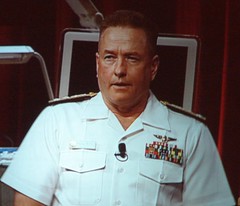

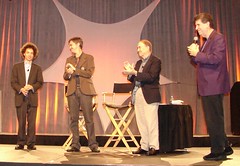
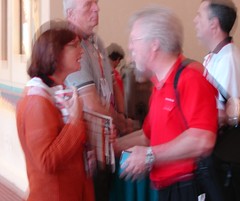
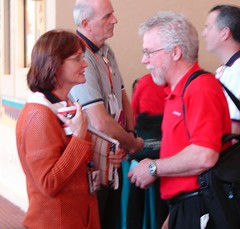





3 Comments:
thinking about 'wandering around the stacks' digitally reminds me again at how magazinelike and linear most websites (and most of the internet is)
category 'mistakes' in humour show/hide the same mistakes in thinking, and affect intuition. Isn't the temperature of the room always room temperature. Should we be thinking about training our intuition, does it happen 'naturally' for some and do others need to be trained? Are there socio-economic issues that affect this?
What is attention anyway?
content is meaningless on its own.
more beer, not peanuts.
closed systems create their own truth, a truth that cannot be applied to external contexts. This is the fallacy of traditional research, to be verifiable it must be closed, and therefore not apply to anything outside the research. powerpoints are the same way.
fantastic post Jay, looking forward to tomorrow!
Hi Jay..
Hello from the waters on the cruise boat on the way to Nassau with my staff for a post-conference decompression.
First of all, thanks for all of your work and efforts and support at our experiment, Learning 2005. As i said the first nite, I set out to do something very diff, with the full intent that some would work, some would morp and some would fail .. and know that we got to some of each through the input and involvement of the "crowd" and key inputters such as yourself.
And, I'd like to continue to work with you as we all add our 5 cents to the evolving field.
I wanted to share a bit of feedback..
* The reason that we locked the front page of the wiki was to make it very fast to load and to also deal with the incredible spamming that our sites hit from both porn and other places around the world. We are a 6/10 on Google and that creates challenges... So, we have created what some change focused groups do.. create 80% openness and zones of gated communities. You can upload at any page other than the front one by using the attachment tool. I have seen about 100 docs go up in the last few days, but I will have our tech check it out on Mondahy when we get back to shore.
* I would also take a bit of colleague exception that we did sage on stage in usual format. Every element was less than 35 minutes throughout the event and that was designed to have them be as interactive as possible with either me, as an advocate of the group or with some levels of table engagement. The challenge is always to mix it up, between old and new .. so that is where we ended up for this first one. For example, if Malcolm gave his usual gig, we would have had the same that he did at 40 other events... in this model, we got very diff stuff out of them.. Just wanted you to see the process.
* The reason that we had 4 tables in front reserved (34 seats out of 1,555) was to eliminate the back stage holding pen for keynotes and folks on the stage. Our goals was to put the keynoters in the front and accessible, as you found when you walked up and dialogued with John Abele and other keynoters.
So, let's keep thinking and innovating together.
Warm regards,
Elliott
Elliott Masie, Host, Learning 2006
www.masie.com
Dear Jay,
Great meeting you & thanks for joining our session on Formal vs Informal. I believe our session demonstrated the value of Informal learning in action. And, by design, we followed the energy of the group ( to me it is the moral equivalent of the wisdom of the crowd ! )
Let's continue our dialog!
Regards,
Deepak ( Dick ) Sethi
dicksethi@yahoo.com
Post a Comment
<< Home